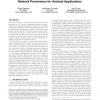Free Online Productivity Tools
i2Speak
i2Symbol
i2OCR
iTex2Img
iWeb2Print
iWeb2Shot
i2Type
iPdf2Split
iPdf2Merge
i2Bopomofo
i2Arabic
i2Style
i2Image
i2PDF
iLatex2Rtf
Sci2ools
109
Voted
CODASPY
2016
2016
On the Origin of Mobile Apps: Network Provenance for Android Applications
Many mobile services consist of two components: a server providing an API, and an application running on smartphones and communicating with the API. An unresolved problem in this design is that it is difficult for the server to authenticate which app is accessing the API. This causes many security problems. For example, the provider of a private network API has to embed secrets in its official app to ensure that only this app can access the API; however, attackers can uncover the secret by reverse-engineering. As another example, malicious apps may send automatic requests to ad servers to commit ad fraud. In this work, we propose a system that allows network API to authenticate the mobile app that sends each request so that the API can make an informed access control decision. Our system, the Mobile Trusted-Origin Policy, consists of two parts: 1) an app provenance mechanism that annotates outgoing HTTP(S) requests with information about which app generated the network traffic, and 2)...
Related Content
| Added | 31 Mar 2016 |
| Updated | 31 Mar 2016 |
| Type | Journal |
| Year | 2016 |
| Where | CODASPY |
| Authors | Ryan Stevens, Jonathan Crussell, Hao Chen 0003 |
Comments (0)

